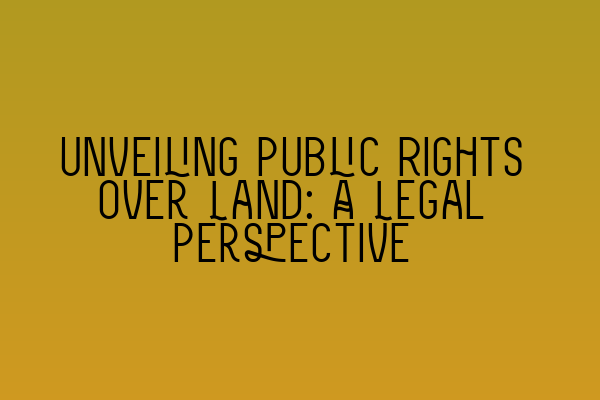Unveiling Public Rights over Land: A Legal Perspective
Welcome to the official blog of SQE Property Law & Land Law. In this article, we will delve into the fascinating world of public rights over land and explore it from a legal perspective. Understanding the intricacies of public rights is essential for any property law professional and can greatly impact the decisions made by individuals, businesses, and institutions when dealing with land ownership and usage. So, without further ado, let’s dive into the subject matter.
What are Public Rights over Land?
In simple terms, public rights over land refer to the legal entitlements and privileges that members of the public have in relation to specific areas of land. These rights are separate from the commonly known private property rights, which are enjoyed exclusively by the landowners themselves.
Public rights over land can include a wide range of permissions and freedoms, such as the right to pass and repass over certain areas, the right to fish in public waters, or the right to use public footpaths and bridleways. These rights are generally presumed to be available to the public unless they have been specifically restricted or limited by law.
Public rights over land are often rooted in historical usage patterns and traditional access routes. They serve to strike a balance between the public’s interest in enjoying and utilizing certain areas of land and the need to respect private property rights and ownership.
How are Public Rights Established?
The establishment of public rights over land can be a complex and nuanced process. It typically involves a combination of historical evidence, customary usage, and legal authorities. In some cases, public rights may be explicitly established through legislation or specific legal actions. For example, the creation of a public right of way might require an application to the local authority or a successful claim in court.
Historical evidence plays a crucial role in determining public rights. An important consideration is the traditional usage of certain areas by the public over an extended period. This usage can include a consistent and uninterrupted passage, recreational activities, or other customary practices. The evidence may come from historical records, maps, witness statements, or any other relevant sources.
When assessing public rights over land, it is essential to consider any associated legal authorities. These can include statutory provisions, common law principles, and judicial decisions that have shaped and defined public rights over time. This legal framework provides guidance on how public rights are to be interpreted and applied in specific situations.
Implications for Property Owners and Users
The existence of public rights over land can have significant implications for both property owners and users. For landowners, it is crucial to understand the extent of public rights that exist on their property to effectively manage and control access. Public rights can impose obligations on landowners, such as maintaining public footpaths or allowing fishing in public waters.
On the other hand, users of land need to be aware of their rights and responsibilities when accessing areas with public rights. Understanding the limitations and permissible activities is essential to avoid any legal issues or disputes with landowners. It is always advisable to consult legal professionals who specialize in property law to ensure compliance with relevant regulations.
Contact SQE Property Law & Land Law
If you require expert legal advice or services regarding public rights over land, do not hesitate to contact SQE Property Law & Land Law. Our team of experienced solicitors specializes in property law and can assist you with a wide range of legal matters, including public rights, land transactions, and dispute resolution.
For further information and resources on SQE preparation, check out these related articles:
- SQE 1 Practice Exam Questions
- SQE 1 Practice Mocks FLK1 FLK2
- SQE 2 Preparation Courses
- SQE 1 Preparation Courses
- SRA SQE Exam Dates
Thank you for reading this article on public rights over land. Stay tuned for more insightful content from SQE Property Law & Land Law!
